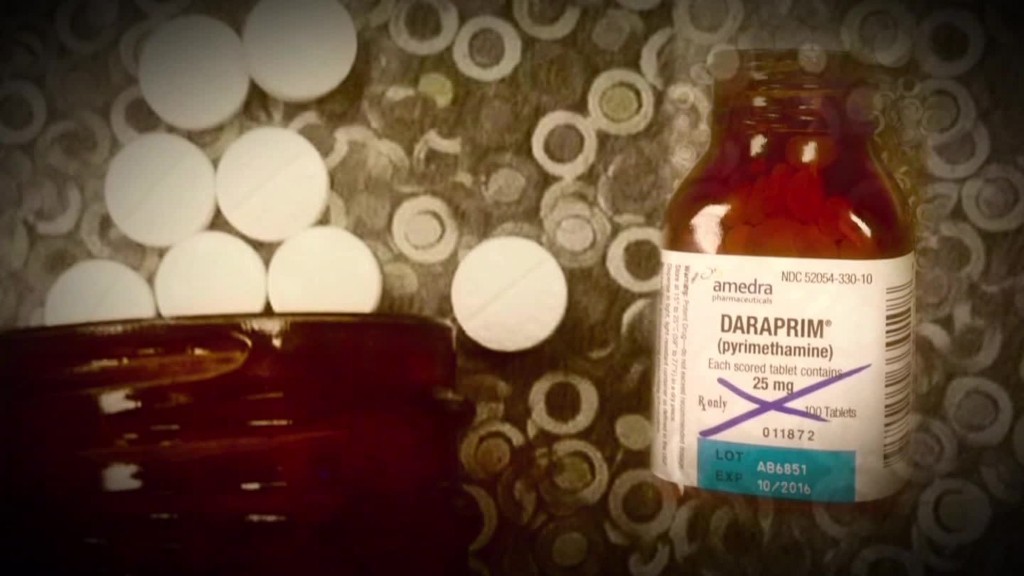
When Turing Pharmaceuticals recently raised the price of an older generic drug by more than 5,000%, the move sparked a public outcry. How, critics wondered, could a firm charge $13.50 a pill for a treatment for a parasitic infection one day and $750 the next?
The criticism led Turing's unapologetic CEO to say he'd pare back the increase -- although no new price has yet been named. The outcry has again focused attention on how drug prices are set in the United States.
Aside from some limited government control in the veterans' health care system and Medicaid, prices are generally shaped by what the market will bear.
A jump in the number of new expensive drugs hitting the market -- along with moves by drugmakers like Turing to raise the price on older and generic drugs -- have helped make prescription drugs the fastest-growing segment of the nation's health care tab.
Two ideas for curbing spending surface every time a price spike renews interest in drug costs: Letting consumers buy products from other countries with lower prices set by government controls and allowing Medicare administrators to negotiate drug prices, from which they are currently barred.
Both proposals are getting an airing in Washington and on the campaign trail, but opposition is heavy and neither is likely to gain much traction.
Drugmakers and some economists argue that price controls or other efforts aimed at slowing spending by targeting profits mean cutting money that could go toward developing the next new cure. Because many pharmaceutical companies spend more on marketing than research, some lawmakers counter that the industry could spend less on promoting its products. Health insurers, in turn, blame drugmakers for high prices, even as they shift more cost to consumers, who then fear they won't be able to afford their medications.
Aside from the perennial ideas, here are other ideas being tried to combat rising prices or at least bring some relief to consumers.
Disclose drug development costs
Lawmakers in several states, including New York, Pennsylvania and Massachusetts, have introduced "transparency" measures that would force drug companies to provide details on how much they spend researching, making and advertising their products.
Proponents say public disclosure would force companies to justify their pricing. Skeptics say disclosure alone may not be enough, so some proposals go further.
Massachusetts, for example, would gather price information on a set of drugs deemed critical to the state and create a commission that could set prices for drugs deemed too costly. None of the measures have passed.
Some economists say research costs aren't a good way to justify a drug's ultimate price. Looking at a single drug produced by a company ignores the huge amounts spent on other products that failed, they say, and such rules might simply foster more money spent on research that isn't needed.
Cap consumer copayments
A growing number of insurers are placing certain high-cost drugs in categories in which consumers have to pay a percentage of the cost -- often upward of 30%. This has caught the attention of lawmakers in a handful of states, including Montana, California and Delaware. They've passed laws capping the amount insured consumers must pay at the pharmacy counter as their share of a drug's cost.
The cost for patients is still high, ranging from $100 to $250 a month, depending on the state. Still, that's less than what consumers currently pay for some drugs in many health insurance plans. While such laws could help consumers with out-of-pocket costs, it doesn't affect the underlying price of those drugs.
Pay up if the product delivers
A drug's price should reflect its effectiveness, according to new efforts under way. Benefit manager Express Scripts, for example, next year will pay varying amounts for a small set of oncology drugs based on how well the products perform on different types of cancer. Food and Drug Administration data show that the drug Tarceva, when given for non-small cell lung cancer, prolongs life an average of 5.2 months, but extends life for only 12 days when given for pancreatic cancer, said Steve Miller, senior vice president and chief medical officer at Express Scripts.
Under the new program, insurers would pay the drugmaker less when the treatment is given to pancreatic cancer patients. It currently costs about $6,200 a month, Miller said. Novartis has said it is in talks with insurers about varying payments based on how well its new heart drug prevents hospitalizations.
Both pricing plans face obstacles, such as how to set the right price and how to determine if it was the drug -- or something else -- that led to fewer hospitalizations. Consumer groups are cautious, saying such "pay for value" ideas hold promise, but only if patients aren't kept from needed medicines.
These are just three of the proposals being weighed as solutions to combat rising drug prices, but none of them will provide a quick fix. Experts advocate for more education for both doctors and consumers. Specifically, they say comparative information about drugs and costs should be more widely available.
Kaiser Health News (KHN) is a national health policy news service. It is an editorially independent program of the Henry J. Kaiser Family Foundation.


